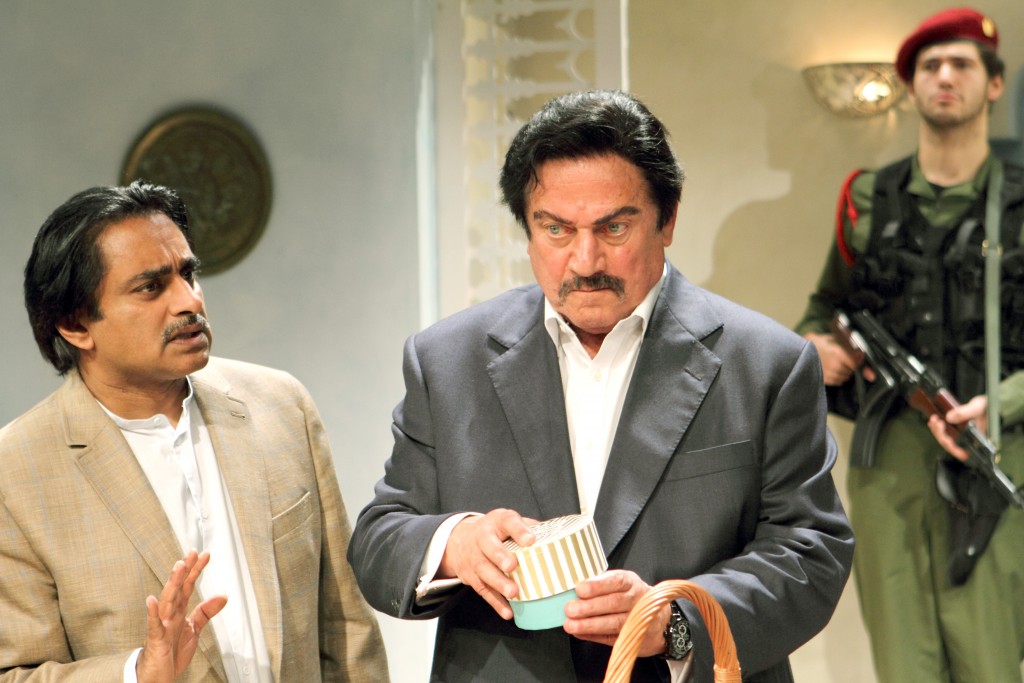Saddam Hussein: Laughing in the face of tyranny
In light of the continuing legacy of Saddam Hussein's rule and the US invasion of Iraq, is it appropriate to stage a comedy about the former despot?

20 October 2015
Upon seeing the world première of Anthony Horowitz's new play Dinner with Saddam, one can't help but feel rather awkward and uncomfortable at a production that tries to transforms Iraq's modern history, with all its conflicts and suffering, into a farcical comedy targeted at an affluent London audience. While it does succeed at generating constant laughter from the spectators, the question forces itself of whether the Iraqi people are quite ready to laugh or find their years of suffering a source of amusement for others, especially as for most ordinary Iraqis the wounds have not yet healed.
The production, directed by Lindsay Posner, is set in the Sunni family's house in Baghdad on March 21, 2003 – a day that will end in “shock and awe”, the start of the American invasion and occupation of Iraq. The father Ahmed, played by Sanjeev Bhaskar of Goodness, Gracious Me and The Kumars at No. 42, is just an ordinary, if rather naive, Iraqi. He is a construction supervisor who refuses to believe that there'll be an American bombardment, just he had not believed that the war with Iran or the invasion of Kuwait would occu, as the audience are informed by his wife Samira played by Shobu Kapoor. Samira represents the voice of the street, the panic of yet another war on an already battered nation and the sense of reality in opposition to Ahmed's survivors' instinct to keep his head down, avoid politics and parrot propaganda in order to protect himself and his family.
The household is already highly strung. Samira is panickly stockpiling supplies, Ahmed is pursuing a rat and unsuccesfully attempting to fix a sewage problem, while their daughter, Rana is refusing to marry her cousin because she is in love with an actor who happens to be Shia and from a different tribe. Rana, played by Rebecca Grant, is also a member of an underground revolutionary group with opposing political views to that of her parents. These tensions are intensified as the family is informed that President Saddam Hussein, played by Steven Berkoff, is arriving shortly for dinner.
As Ahmed unintentionally poisons the head of the president's security apparatus, it is left to Samira and Rana to welcome and entertain Saddam Hussein. This is something that was common in Iraqi society at the time, where women were often left to deal with many aspects o life while their men were out on the battlefield. Iraqi women were and are renowned for their strength and resilience. This made the plotline involving the forced/arranged marriage of Rana and her mother before her somewhat difficult to swallow. Though this may be common in the more conservative and provincial south and north of the country, it is relatively rare in cosmopolitan Baghdad. Similarly, the sectarian tone that is present in the play seemed to be a rather weak attempt by the writer to fit all of the issues that have been affecting Iraq for decades into a single production. The Shia-Sunni tension was never a real issue before the US invasion, and where it did exist would have been outside Baghdad, as the capital city was a place where intermarriage was common. Rana's parents' disapproval of her lover would have been more convincing if the only objection was to his being an actor, as Iraqi society tends to look down on the acting profession.
Berkoff's portrayal of Hussein was quite impressive. He managed to bring to the stage the complex nature of a man who fascinated and divided the world, even after his death. Saddam Hussein's oblivion to the effect of UN sanction on his nation, his failure to recognise his brutality and tyranny, and his belief that all his actions were justified for the sake of “his people” are very close to the traits associated with the former Iraqi despot, whether gleaned from interviews he gave or well-researched books into his personality.
At the dinner table, the conversation is rather one-sided, as Saddam list everything he believes he has done for Iraq. Rana plays devil's advocate and keeps reminding the president of the less positive aspects of his rule, such as the continuous wars and the gassing of the Kurds. Rejecting her line of argument, he reminds the family that the Baath party would never have come to power without the CIA, that the Americans were supportive of Iraq's war with Iran and that the British were gassing Kurds long before Saddam Hussein was born. It is at this point that the audience is introduced to the Western's world involvement and contribution to Iraq's tragic history. When a security guard unwisely yawns while the dictator is narrating one of his long-winded tales, he is taken out to be shot, while Rana inexplicably goes unpunished for her insolence. Hussein was infamous for his unending speeches which often lasted a couple of hours and were broadcasted several times during the week. Even the brutal murder of the guard is justified by the dictator who recounts the fate of his own family members who didn't get spared, implying that he is even-handed in his tyrannical “justice”.
If you're wondering why the president would visit this average family, it is because he is t rying to elude detection by the American army. However, he says that it is his way of keeping close to his people. However, this claim is quickly undermined when Ahmed's family see a life that they didn't know about which is represented through the succulent food and fine Portuguese wines.
The play ends with two major metaphorical moments, which may or may not have been intentional. There is a hint of what Saddam Hussein's would become in the very near future when Ahmed accidentally gives him a bag full of excrement. As the curtains are about to go down, another symbolic irony occurs. Samira is convinced that the American army will attack them, while the ever-optimistic, or possibly deluded, Ahmed believes that nothing will happen and they will come to no harm once they are rid of their unwanted guest. This marks the first sign of hope the audience sees upon Ahmed's face. As the family toast new beginnings with the wine left behind by the departing dictator, there is a loud bang and it is obvious that their house has been the target of an American bombing.
Like Iraq itself, the family's hope for a better tomorrow was short-lived and ended in tragedy.
Dinner With Saddam is being performed at Menier Chocolate Factory, London, until 14 November 2015.


